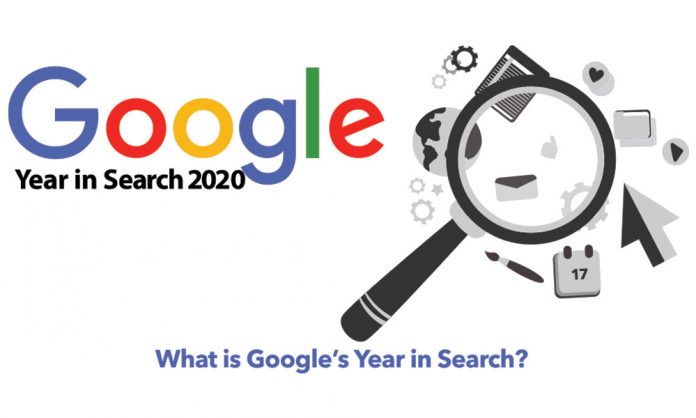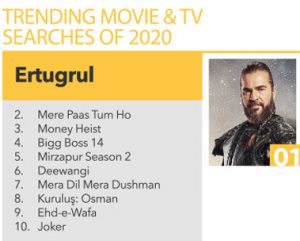Google looks back at 2020 through searches providing a unique perspective on the year’s searches and trends that captured our attention.
What is Google’s Year in Search?
Google Year in Search documents the internet’s spirit of the times through an exploration of the over one trillion search queries received each year.
In addition to Year End Searches, which highlight the top trends of the year, there are several tools that give insight into global, search queries occur over time, and cannot be used to identify the individual users.
How are the trending lists populated?
Lists are based on search terms that had the highest spike in 2020 as compared to 2019.
![]()
Year in Search Pakistan looks back at 2020 through the collective eyes of searches on Google Pakistan and offers a perspective on the year’s major events, hottest trends and changes in behavior due to COVID-19 based on searches conducted in Pakistan.
![]()
![]()
![]()
- Because “WAITING IT OUT” IS NOT AN OPTION
In 2020, worldwide searches for support small business doubled compared to the previous year.

As we reluctantly accepted shelter-in place routines as a “new normal”, small businesses in nearly every local community faced an even scarier reality: the possibility of going out of business. From generations-old mom-and-pop cafes to startups. many small businesses across the globe went from profitable to survival mode- seemingly overnight.
Not wanting to lose the flavor or character of their communities, people took to the internet to figure out ways to help. From shopping local online to buying gift cards to straight-up cash donations- we showed up for small business however we could. Searches for “support small business” increased 10x in March, just after the onset of COVID-19, and has remained above 2019 levels ever since.
2. HASHTAGS THAT HELPED HEAL
how to be an ally was searched more than how to be an influencer.

Searches for “how to be an influencer” are consistently high every year. But this year was a little different- searches for “how to be an ally” exceeded “how to be an influencer” searches in June of 2020.
All over the world, we saw this shift in values as people turned their energies to being supportive, empathetic, and taking a stand for voices unheard. For many people, allyship meant standing with and for marginalized communities, committing to personal and public changes, and engaging in concrete actions to disrupt systemic oppression.
And in 2020, the world did just that- with tangible acts ranging from far-reaching online campaigns to mute bigotry and elevate Black and brown voices, to deeply personal explorations examining attitudes, behaviors, and privilege. And in a strange roundabout way, perhaps they became influencers in the process as well- by wholeheartedly emboyding what the hashtags preach: #allyship.
DELIVERING HOPE AND HEALING

This year, we focused on helping others more than we focused on ourselves – how to donate was searched 2x more than how to save money.
During the onset of COVID-19, it rapidly became clear that a chain reaction of need had been put into play. Nearly every type of organization, from local community centers to metropolitan hospitals, had needs that outstripped their abilities to meet them. And the world stepped up, prioritizing others over themselves. Individuals donated money, time, food, clothing, masks, and more as they looked for ways to contribute as much help as they could.
Among the top things we searched to donate? PPE, blood, and plasma – lifesaving gifts for essential workers and patients battling the pandemic that had put the world on hold.
ABOUT IBRAM X.KENDI, AUTHOR OF HOW TO BE ANTIRACIST

World events gave us pause, and we did some soul-searching. In June 2020, how to be anti-racist was searched more than how to be a millionaire.
Dr. Ibram X. Kendi is the founding director of the Boston University Center for Antiracist Research and the Andrew W. Mellon Professor in the Humanities at BU. He is also the #1 New York Times bestselling author of 2019’s How to Be an Antiracist.
In the book, Professor Kendi outlines ways to reshape the conversation about racial justice in America and challenges readers to not only think about their most deeply-held beliefs, but also about what an antiracist society might look like.
Professor Kendi is also a contributing writer at The Atlantic and the CBS News Racial Justice Contributor. He currently sits as the 2020-2021 Frances B. Cashin Fellow at the Radcliffe Institute for the Advanced Study at Harvard University and is the National Book Award winner for 2016’s Stamped from the Beginning.

Searches for mask emoji surpassed searches for hug emoji. Because hugs are great, but hey… wear a mask.

Kids in distance learning = parents in distance teaching.
how to be a teacher was searched more than ever in 2020.

Comfort foods may have gotten us through March, but…how to start a vegetable garden was searched twice as much in 2020 than 2019.

Essential workers were our lifelines this year. Global searches for how to thank hit an all-time high, with teachers, bus drivers, nurses, and doctors topping our lists.

We looked for a better future more than we wished to return to the past. how to change the world was searched twice as much as how to go back to normal.
Visit about.google/stories/year-in-search-2020 to explore the rest of the Year in Search stories and top trending charts from countries around the world.












